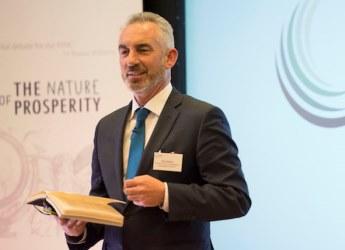40th T.B. Macaulay Lecture - Prosperity Without Growth: Foundations for the Economy of Tomorrow

Tim Jackson, Professor of Sustainable Development at the University of Surrey and Director of the Centre for the Understanding of Sustainable Prosperity (CUSP), will deliver the 40th T.B. Macaulay Lecture, which will take place for the second year at Our Dynamic Earth in Edinburgh.
The publication of his book Prosperity without Growth was a landmark in the sustainability debate. In it, Jackson challenges conventional economics and openly questions the most highly-prized goal of politicians and economists alike: the continued pursuit of exponential economic growth. His findings provoked controversy, inspired debate and led to a new wave of research building on its arguments and conclusions. Seven years after it was first published, on the occasion of substantially revised and updated second edition, Jackson will discuss how much has changed (and remained unchanged) in the interim and argues that building a ‘post-growth’ economy is now a precise definable and meaningful task.
Tim Jackson holds a Professorial Fellowship on Prosperity and Sustainability in the Green Economy (PASSAGE). In addition to this he is an award-winning playwright with numerous radio-writing credits for the BBC.
He joined the University of Surrey in 1995 under a Royal Academy of Engineering fellowship on the thermodynamics of clean technology, after five years as Senior Researcher at the Stockholm Environment Institute. In April 2000, he was appointed as Professor of Sustainable Development at Surrey, the first such chair to be created in the UK. Between January 2003 and April 2005, Jackson held a research fellowship on the social psychology of sustainable consumption, supported by the ESRC's Sustainable Technologies Programme.
His monograph Motivating Sustainable Consumption (2005) drawing on research from that period is still widely cited in both academic and policy circles and was influential in framing the Changing Behaviours chapter in the 2005 UK Sustainable Development Strategy.
During his time at the Stockholm Environment Institute, he pioneered the concept of preventative environmental management outlined in his 1996 book Material Concerns: pollution profit and quality of life. In 1996 he co-authored (with Nic Marks) the first Index of Sustainable Economic Welfare for the UK and has continued to work closely with the New Economics Foundation and others on measures of sustainable wellbeing at national and regional level.
During the last decade, he has led numerous research and policy initiatives on sustainable consumption and production in the UK and abroad. From June 2004 to March 2006, he was the sole academic representative on the UK Sustainable Consumption Round Table and co-authored their influential report I will if you will. In 2006 Tim published the Earthscan Reader on Sustainable Consumption.
He led the team which developed the Surrey Environmental Lifestyle Mapping (SELMA) model used to estimate the UK's 'carbon footprint' for the Carbon Trust. He is a co-author of the WorldWatch Institute's influential State of the World 2008 on sustainable economies. From 2006 to 2009, he led the SDC’s Redefining Prosperity programme and authored the controversial report, later published by Earthscan as Prosperity without Growth: economics for a finite planet.
The annual Macaulay Lecture is given to stimulate thinking and dialogue about contemporary environmental issues in order to honour the vision of Dr Thomas Bassett Macaulay. Dr Macaulay was one time President and Chairman of the Sun Life Assurance Company of Canada who provided an endowment to found the Macaulay Institute for Soil Research in Aberdeen in 1930; a predecessor of the James Hutton Institute, a world leader in research in the land, crop, water, environmental and socio-economic sciences. The lecture is presented in partnership by the James Hutton Institute and the Macaulay Development Trust.
The lecture is by invite only, however, if you would be interested in attending, please email Events to register your interest. Blackwell’s bookstore will be hosting a book signing of Prosperity Without Growth: Foundations for the Economy of Tomorrow at the event as well.





